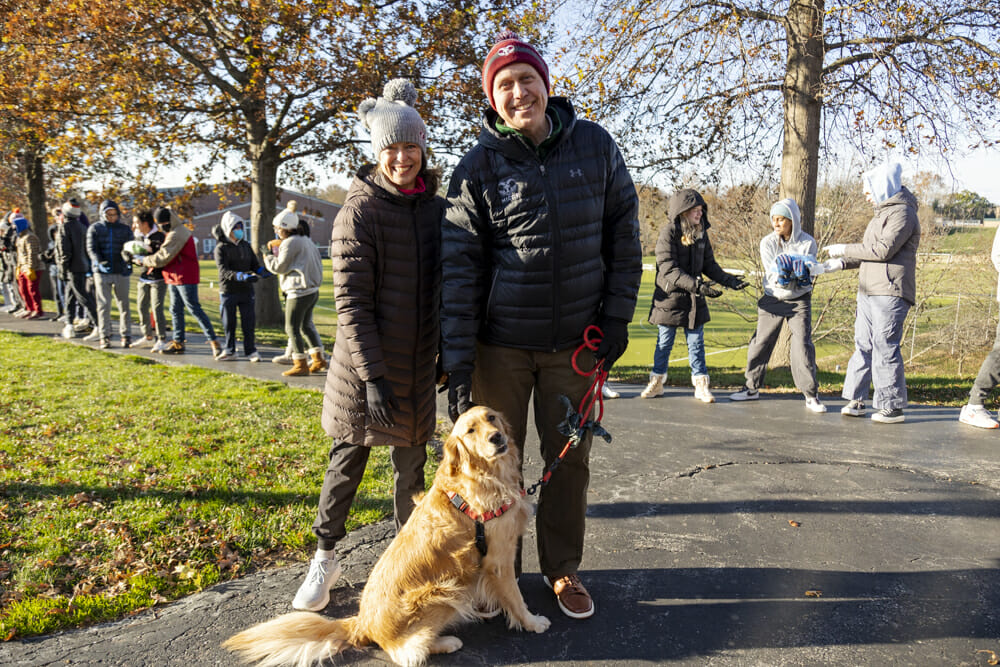The following letter is an expansion of remarks delivered at the all-school Thanksgiving assembly in the McDonnell Athletic Center (“the MAC”) on Friday, November 18.
Albert Schweitzer, an esteemed 20th-century humanitarian and the 1952 recipient of the Nobel Peace Prize, once observed that “the great enemy of morality has always been indifference.” In other words, the reason we stop doing good things for other people is that we stop caring about doing good things for other people–a closing of our hearts that hurts us as much as it hurts others.
“To remain good means to remain wide awake,” Schweitzer wrote. “We are all like people walking in the bitter cold and snow. Woe to the person who gives way to exhaustion, sits down, and falls asleep. Our inmost moral being perishes when we are too tired to share the life and experiences and sufferings of the creatures around us.”
Perhaps it was his reference to “the bitter cold” that brought Schweitzer to mind for me this morning. Our annual Turkey Train left its north campus station at approximately 8:05 a.m. in 23-degree weather and rolled south for the next half hour as our Upper School students passed 100 frozen Thanksgiving birds person by person, gloved hands to gloved hands, to the end of the line in the MAC. From there they were delivered to the St. Louis Area Foodbank along with non-perishable items provided by our Lower and Middle School students, to be combined with the numerous other Upper School turkeys that did not take the train. (100 was only a fraction of the total quantity donated.) In aggregate, our students’ gifts amounted to thousands of pounds of food to be shared with families across our region who suffer from nutrition insecurity.
The Turkey Train, the Lower and Middle School food drives, and the all-school gathering that follow them are celebratory, even festive occasions, and it was wonderful to revive these MICDS traditions after two years of pandemic-imposed adaptations. Mr. Huber, an Upper School Fine and Performing Arts teacher, set up speakers behind Olson Hall to provide a Turkey Train soundtrack. (Peace Train was an on-the-nose choice, but given the morning’s numbing frigidity, I kept waiting to hear Can’t Feel My Face.) As students, faculty, and staff all proceeded into the MAC and arranged themselves in assembly, the Upper School Band provided further music for our enjoyment; and as the program concluded–after Nikitha Ada ’23 and Sanchi Vishwakarma ’23, co-heads of the Upper School Service Committee, thanked Foodbank representative Jordan Brennan for our long-standing partnership, and after a group of fourth- and eighth-grade students presented Ms. Brennan with a symbolic gift basket–the Chamber Choir and Upper School Orchestra performed the MICDS Alma Mater in unison, followed by final selections from the Upper School Band during our adjournment.
“If music be the food of love, play on,” or so insists the famous opening of Shakespeare’s Twelfth Night–and charity is literally a kind of love. That the acknowledgement of our community’s Thanksgiving charity would be underscored by so much music, therefore, is entirely appropriate. We would do well at the same time, however, not to distract our attention from the profoundly difficult circumstances–the profoundly real human suffering and sorrow in our wider community–to which our philanthropy and its soundtrack today are a response. We should, indeed, open ourselves to this suffering and sorrow unflinchingly, and not only for the betterment of others but for our own betterment.
“The sharing of sorrow,” Schweitzer said, “expands your capacity to share joy as well. When you ignore the suffering of others, you lose the capacity to share their happiness too. And however little joy we may see in this world, the sharing of it, together with the good we ourselves create, produces the only happiness which makes life tolerable.” I had the privilege yesterday of attending the funeral of Dr. Martin Mathews, a co-founder of the Mathews-Dickey Boys’ & Girls’ Club in north St. Louis City. Over the course of his 97-year life, Dr. Mathews was a relentless advocate for children and community outreach who made a positive difference in thousands of other lives, young and old alike. Mr. Wendell Covington, who was the seventh of fourteen people to celebrate him at the service, recalled Dr. Mathews’ encouraging him once in a moment of self-doubt that he was “old enough to know, and young enough to grow.” (Aren’t we all?) It was Dr. Mathews’ exceptional gift for motivation and inspiration, I learned, that explained so much of his success–along with his courage to share in other people’s sorrow, and thus to share in their joy. Mr. Raymond Turner, who was the eighth of Dr. Mathews’ fourteen eulogists, said simply, “He was the best person I have ever known in my life.”
Albert Schweitzer understood, as Martin Mathews understood, and as so many other wise people throughout human history have understood, the paradoxical reciprocity of giving. The self gains most when it is most selfless. “So I tell you,” Schweitzer warned, “do not let your hearts grow numb. Stay alert. It is your soul which matters.”
I would appeal to you to put joy into your world so that you can receive joy into your heart. There is no surer path to a meaningful and happy life. Always reason, always compassion, always courage. Thank you all for your gifts to the St. Louis community today, and happy Thanksgiving.
Jay Rainey
Head of School
